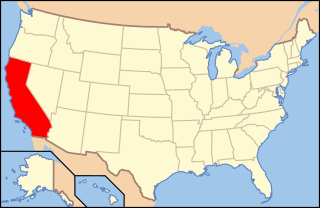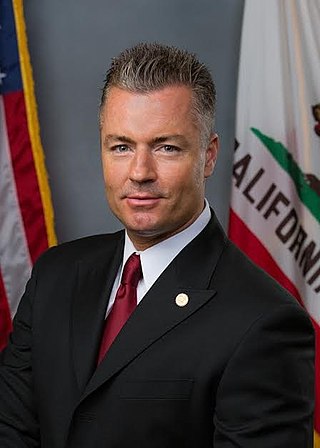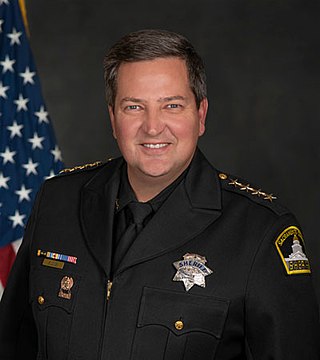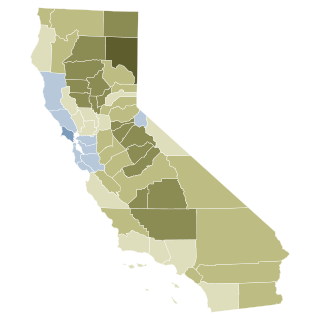Related Research Articles

Thomas Miller McClintock II is an American politician serving as the U.S. representative for California's 5th congressional district since 2009. His district stretches from the Sacramento suburbs to the outer suburbs of Fresno; it includes Yosemite National Park. A member of the Republican Party, McClintock served as a California state assemblyman from 1982 to 1992 and from 1996 to 2000, when he became a California state senator, a position he held until 2008. He unsuccessfully ran for governor of California in the 2003 recall election and for lieutenant governor of California in the 2006 election.

Gavin Christopher Newsom is an American politician and businessman who has been the 40th governor of California since 2019. A member of the Democratic Party, he served as the 49th lieutenant governor of California from 2011 to 2019 and the 42nd mayor of San Francisco from 2004 to 2011.

California Proposition 5, or the Nonviolent Offender Rehabilitation Act was an initiated state statute that appeared as a ballot measure on the November 2008 ballot in California. It was disapproved by voters on November 4 of that year.

Richard Gil Kerlikowske is a former Commissioner of U.S. Customs and Border Protection. He assumed office on March 6, 2014 and retired January 20, 2017. He also served as the Director of the Office of National Drug Control Policy between 2009 and 2014.

The Marijuana Control, Regulation, and Education Act, also known as California Assembly Bill 390 and later Assembly Bill 2254, is the first bill ever introduced to regulate the sale and use of marijuana in the U.S. state of California. If passed and signed into law, marijuana would be sold and taxed openly to adults age 21 and older in California. Tom Ammiano, a Democrat representing California's 13th State Assembly district, introduced this piece of legislation on February 23, 2009, arguing that the bill will "tax and regulate marijuana in a manner similar to alcohol." As introduced, this proposal is estimated to raise over $1 billion in annual revenue by taxing the retail production and sale of marijuana for adults 21 years of age and older. To obtain a commercial grow license one would pay an initial $5,000 fee, then a $2,500 fee each year after that. A tariff of $50 per ounce would also be placed on all sold and grown marijuana. The bill has gained much media attention, statewide and nationally.

Cannabis in California has been legal for medical use since 1996, and for recreational use since late 2016. The state of California has been at the forefront of efforts to liberalize cannabis laws in the United States, beginning in 1972 with the nation's first ballot initiative attempting to legalize cannabis. Although it was unsuccessful, California would later become the first state to legalize medical cannabis through the Compassionate Use Act of 1996, which passed with 56% voter approval. In November 2016, California voters approved the Adult Use of Marijuana Act with 57% of the vote, which legalized the recreational use of cannabis.

California is seen as one of the most liberal states in the U.S. in regard to lesbian, gay, bisexual, transgender (LGBT) rights, which have received nationwide recognition since the 1970s. Same-sex sexual activity has been legal in the state since 1976. Discrimination protections regarding sexual orientation and gender identity or expression were adopted statewide in 2003. Transgender people are also permitted to change their legal gender on official documents without any medical interventions, and mental health providers are prohibited from engaging in conversion therapy on minors.

California Proposition 19 was a ballot initiative on the November 2, 2010, statewide ballot. It was defeated, with 53.5% of California voters voting "No" and 46.5% voting "Yes." If passed, it would have legalized various marijuana-related activities, allowed local governments to regulate these activities, permitted local governments to impose and collect marijuana-related fees and taxes, and authorized various criminal and civil penalties. In March 2010, it qualified to be on the November statewide ballot. The proposition required a simple majority in order to pass, and would have taken effect the day after the election. Yes on 19 was the official advocacy group for the initiative and California Public Safety Institute: No On Proposition 19 was the official opposition group.

Travis Ethan Allen is an American politician who served as a Republican member of the California State Assembly. Allen was first elected in November 2012 to represent California's 72nd State Assembly district, which includes the cities of Fountain Valley, Los Alamitos, Seal Beach, and Westminster, most of Garden Grove, portions of Huntington Beach and of Santa Ana, and the unincorporated communities of Midway and Rossmoor.

Patricia "Pat" Carmody Bates is an American Republican politician currently serving in the California State Senate, representing the 36th Senate district, which encompasses parts of Orange and San Diego counties. She served as the Senate's minority leader from 2017 to 2019. She previously served as a member of the Orange County Board of Supervisors from 2007 to 2014, and the California State Assembly from 1998 to 2004. She also served as the first mayor of Laguna Niguel, California following its incorporation in 1989, and continued to serve on the city council until 1998. Before serving as mayor, she had been employed as a social worker in Los Angeles County.

Scott Robert Jones is an American attorney, politician, and former law enforcement officer who served as the sheriff of Sacramento County, California from 2010-2022. Jones was first elected in 2010, winning re-election to his post in 2014 and again in 2018.

The Adult Use of Marijuana Act (AUMA) was a 2016 voter initiative to legalize cannabis in California. The full name is the Control, Regulate and Tax Adult Use of Marijuana Act. The initiative passed with 57% voter approval and became law on November 9, 2016, leading to recreational cannabis sales in California by January 2018.

David Hyon Moon is an American activist, lawyer, and politician. He is currently a member of the Maryland House of Delegates representing District 20 in Montgomery County, Maryland. Since 2023, he has served as the Majority Leader of the Maryland House of Delegates.

The Bureau of Cannabis Control is an agency of the State of California within the Department of Consumer Affairs, charged with regulating medical cannabis (MMJ) in accordance with state law pursuant to the Medical Cannabis Regulation and Safety Act passed by the legislature in 2015 and the Adult Use of Marijuana Act, passed by voter initiative in November 2016. The agency was charged with creating rules for the legal non-medical market to take effect January 1, 2018; and to regulate the state's multibillion dollar medical program for the first time. The first agency leader, Lori Ajax, referred to in multiple media outlets as the state's cannabis "czar", was appointed by the governor in February 2017. State senator Mike McGuire has expressed doubt that the board would meet deadlines to allow regulated retail sales by 2018 as planned.

The Donald Trump administration took positions against marijuana and against the easing of laws regarding marijuana. Although Trump indicated during his 2016 presidential campaign that he favored leaving the issue of legalization of marijuana to the states, his administration subsequently upheld the federal prohibition of cannabis, and Trump's 2021 fiscal budget proposal included removing protections for state medical marijuana laws. In 2018, the administration rescinded the 2013 Cole Memorandum, an Obama-era Justice Department policy that generally directed federal prosecutors not to pursue marijuana prosecutions in states where marijuana is legal as a matter of state law.
The Cannabis Regulation and Tax Act is an act legalizing and regulating the production, consumption, and sale of cannabis in Illinois. It was approved by both houses by May 31, 2019 and came into effect January 1, 2020.

The movement to decriminalize psilocybin in the United States began in 2019 with Denver, Colorado, becoming the first city to decriminalize psilocybin in May of that year. The cities of Oakland and Santa Cruz, California decriminalized psilocybin in June 2019 and January 2020, respectively. Washington, D.C., followed suit in November 2020, as did Somerville, Massachusetts, in January 2021, and then the neighboring Cambridge and Northampton in February 2021 and March 2021, respectively. Seattle, Washington, became the largest U.S. city on the growing list in October 2021. Detroit, Michigan followed in November 2021.
Lexipol LLC is a private company based in Frisco, Texas that provides policy manuals, training bulletins, and consulting services to law enforcement agencies, fire departments, and other public safety departments. In 2019, 3500 agencies in 35 U.S. states used Lexipol manuals or subscribed to their services. Lexipol states that it services 8,100 agencies as of March 2020. Lexipol retains copyright over all manuals that they create, even those modified by local agencies, but does not take on the status of policymaker. Critics note that a decision made by Lexipol becomes policy in thousands of agencies and that there is little transparency into how the policy decisions are made.

SB 1421, Senate Bill 1421, or Peace Officers: Release of Records, is a California state law that makes police records relating to officer use-of-force incidents, sexual assault, and acts of dishonesty accessible under the California Public Records Act. The bill was signed into law by then-governor Jerry Brown on September 30, 2018, and took effect on January 1, 2019.

Proposition 25, officially the Referendum to Overturn a 2018 Law That Replaced Money Bail System with A System Based on Public Safety Risk, is a California ballot proposition that appeared on the ballot for the general election on November 3, 2020. The "no" side prevailed, resulting in retention of the system of cash bail in the state.
References
- ↑ "About CPOA". California Peace Officers Association | CPOA. Retrieved 2020-06-07.
- ↑ "2019 - 2020 Board of Directors". California Peace Officers Association | CPOA. Retrieved 2020-06-07.
- ↑ Stanton, Sam (2014-10-17). "Proposition 47 would lower penalties to reduce prison population, pay for programs". The Sacramento Bee .
- ↑ White, Jeremy B. (2016-05-17). "California marijuana legalization draws lawmaker opposition". The Sacramento Bee .
- ↑ Hart, Angela (2017-04-05). "Immigrants rights activists press for support of California's 'sanctuary state' bill". The Sacramento Bee .
- ↑ Samuels, Brett (2018-03-07). "Sessions to California: 'There is no secession'". The Hill . Retrieved 2020-06-07.
- ↑ Samuels, Brett (2018-03-06). "Jerry Brown: Sessions's 'sad' political stunts won't work in California". The Hill . Retrieved 2020-06-07.
- 1 2 Rodrigo, Chris Mills (2019-10-09). "California blocks police body cameras from using facial recognition". The Hill . Retrieved 2020-06-07.
- ↑ "Facial recognition misidentified 26 California lawmakers as criminal suspects". San Francisco Chronicle . 2019-08-14. Retrieved 2020-06-07.